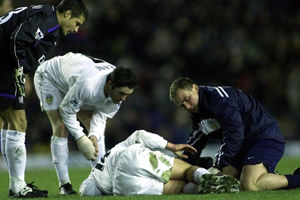You can take him to several other top clubs, including a Champions League final with Saturday’s opponents Chelsea, to the pinnacle of football aspirations with England, to working in basketball and baseball in America with the New York Knicks and Washington Nationals, to then launching and heading up his own hugely successful software company, Apollo MIS.
You can do all that. But you can’t take the Wolverhampton memories out of the physio!
“Y’owm alright?” asks Dave Hancock, at the start of our conversation.
Over 30 years since he landed his first full-time job in the industry, as assistant physio to Barry Holmes at Wolves, Hancock hasn’t forgotten the local dialect! Nor the value of the opportunity he was handed in his early twenties.
“It was Graham Taylor who first gave me a chance, after what amounted to a three or four day interview at Wolves,” he recalls.
“He was such a great person to learn off, so straight off the bat as a manager, and so organised and methodical.
“He included everyone - which I loved - a real backroom team approach, and had already had so much success as a club boss with Watford and Aston Villa and then becoming national team manager.
“It was a really good and valuable insight and opening for me into the world of football.
“I loved it at Wolves, experiencing so many stepping stones which helped me start my career, including making mistakes and learning from those mistakes, but all with so much mutual respect.”
Three decades on, and Hancock can reflect on Taylor being the first of so many high profile and regularly successful managers whom he worked for during a lengthy spell in various dugouts and treatment rooms.
After Taylor and Mark McGhee at Wolves, amongst others, came Graeme Souness at Blackburn, David O’Leary, Terry Venables, and Peter Reid at Leeds, Jose Mourinho at Chelsea, Fabio Capello and Roy Hodgson with England.
“Working with so many top managers delivered lots of different scenarios and was a great learning experience,” says Hancock.
“Different cultures, different nationalities, different ways of working, but I could take something from all of them.
“As I became older and more experienced, working with that calibre of manager I learned how to get on and adapt and aim to be successful within the environment I was operating in.”
And adapt Hancock did. To hugely successful effect. So much so, that after 25 years of working in sport and with athletes, he launched his own business, with Apollo now having offices in New York – where he is based – and Leeds.
Apollo is a cutting edge sports software platform using AI that transforms how teams collect and analyse data on injuries, games, practices and performance.

Leeds United's Stephen McPhail lies on the floor injured as team-mate Robbie Keane and physio Dave Hancock
As Hancock explains, whilst the business is only a few years in operation, the idea and the science behind it was in his mind and consciousness for way longer than that.
“Apollo was my brainchild but linked also to working with the guy who created Prozone, the analysis platform which revolutionised data and was a gamechanger in the Premier League in the early 2000s,” he reveals.
“I went in with this idea and we built a product but my career as a physio really took off and I didn’t really have time for the company.
“At that time, it was run like a ‘Mom and Pop Shop’, with two or three people, and a bit of investment, and not really as a proper business.
“It was about five years ago that I decided I’d done a good stint of 25 years working in sport and with athletes, and so I put the old product in the bin and started again.
“I started building it as a proper company with a proper structure with people on the board, and it has been growing ever since.
“It’s all about doing something quite innovative around data, and tech, and AI, leveraging machine learning and data analytics to enhance performance and prevent injuries."
Apollo already boasts numerous very high profile clients. Three Premier League teams are signed up, pretty much half of the Championship, teams in the MLS (Major League Soccer), MLB (Major League Baseball), the NFL (American Football), and teams in China, Japan, Australia and Saudi Arabia.
The business and the technology is clearly proving a huge success. But Hancock also believes it is used best - and indeed sports medicine is delivered best - when the data and technology is operated alongside the human eye and human experience.
It’s about finding a balance of the subjective and the objective, utilising the incredible advances in both data and technology of the last couple of decades, but in tandem with the skill and expertise of the coaches and practitioners.
In an excellent recent ‘Strain on the game’ podcast, where Hancock joined former England defender Stephen Warnock and elite performance coach and sport scientist Adrian Lamb, he spoke about working for Mourinho, who possessed a seemingly innate ability to judge training loads.
“One of the reasons we were so good at Chelsea in Jose’s first spell was not because we had a great medical team, but because he was so good at periodisation in training,” Hancock explained.
“He was just so good at it, and so we didn’t have many injuries.
“He knew when to push, or when to pull back, and would phase the training days, so one day might be all neural where the warm-up and the training was really quick and fast, and 40 minutes later the players were back in the dressing room.